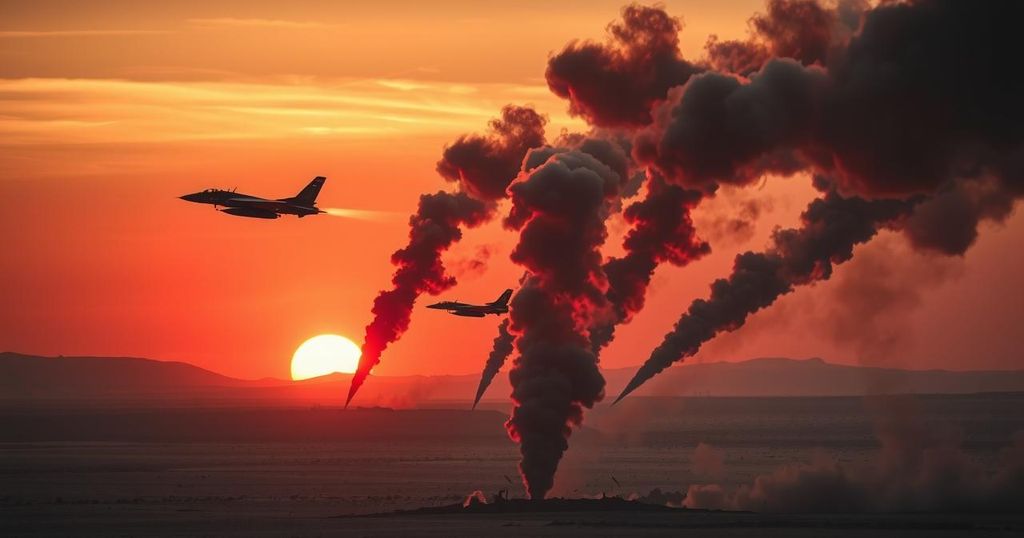U.S. airstrikes have targeted Houthi military capabilities in Yemen, claiming over 30 hits on drone and missile sites. President Trump emphasizes Iran’s responsibility in any retaliation. Ongoing debates concerning U.S. intervention reflect concerns about Iran’s influence and regional stability amidst escalating conflict. The situation further complicates as Iran continues its uranium enrichment activities, raising nuclear proliferation fears.
Recent U.S. airstrikes targeted Houthi military assets in Yemen, successfully dismantling drone, missile, and air defense systems. The operation reportedly neutralized over 30 Houthi targets, including weapons manufacturing and training facilities, as affirmed by Lt. Gen. Alexus Grynkewich, who reported numerous military casualties without civilian impacts. However, the broader implications for Iranian influence remain uncertain.
The strikes, which commenced on Saturday and extended through Monday, resulted in Yemen’s Houthi rebels claiming 53 fatalities. Pentagon spokesperson, Sean Parnell stated the operation’s focus was to make it clear that aggression towards American forces would have consequences, reinforcing that it is not aimed at regime change but prioritizes U.S. interests.
President Donald Trump reaffirmed that while the Houthis were the immediate target, Iran would be accountable for any retaliatory actions. He declared that any further attacks from the Houthis would be considered acts directly associated with Iran, necessitating a response. Trump also emphasized that Iran could no longer evade responsibility for its support of the Houthis.
The Houthis had escalated their threats against Israeli interests, claiming to pressure for humanitarian aid access to Gaza. Despite recent diplomatic overtures from Trump to engage Iran regarding nuclear discussions, Iran’s response to the maximum pressure sanctions was one of outright refusal. Trump pledged to continue military strikes until the Houthi threat was decisively eliminated, although specifics on achieving this outcome were not provided.
Questions about U.S. troop involvement in Yemen remain unanswered, as Parnell suggested that discussing troop posture would compromise strategic ambiguity. Experts, like Zineb Riboua, highlighted the challenge posed by Iran’s continued supply of support to the Houthi rebels, raising doubts about the operation’s long-term success in crippling Houthi military capabilities.
In light of these tensions, Secretary of State Marco Rubio reported that Houthi fighters had directly attacked the U.S. Navy 174 times in the last 18 months. The ongoing conflict has rendered vital shipping lanes in the Red Sea perilous, jeopardizing the flow of goods, humanitarian aid, and significantly impacting global trade.
Several analysts debated the U.S. involvement in this conflict, questioning the advantages of expending resources combating the Houthis, especially given their minimal attack record on maritime targets. Gene Moran, a former Navy captain, noted that while decisive action is necessary, kinetic responses alone will not effectively address ideological challenges posed by Iran.
Lastly, the situation regarding Iran’s nuclear developments grows more alarming, as evidence indicates that uranium enrichment has approached levels near those required for weaponization. Although Iran maintains that it does not seek nuclear weapons, the international community remains vigilant against its nuclear advancements.
U.S. airstrikes against Houthi targets have raised significant questions regarding the impact on Iranian influence and broader regional stability. President Trump’s administration continues to assert that Iran bears responsibility for Houthi actions, signaling a departure from prior military strategies. While the immediate military objectives may appear achieved, the long-term efficacy of these efforts, particularly in mitigating Iranian support for the Houthis, remains in doubt. The evolving geopolitical landscape demands careful consideration of U.S. involvement and resource allocation.
Original Source: www.foxnews.com




